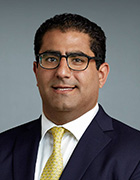Listen Now
Topics Covered
- Non-Small Cell Lung Cancer Overview, in the Context of COVID, Seasonal Flu & RSV
- Definition of Genomics and Biomarker Testing
- The Difference Between Genomics & Genetics
- The Role of Biomarker Testing in the Treatment of Non-Small Cell Lung Cancer
- Specific Examples of How Biomarker Testing May Inform Treatment Decisions
- Precision Medicine & Non-Small Cell Lung Cancer
- Current Research in Genomics & Non-Small Cell Lung Cancer
- Liquid Biopsies
- The Role of the Pathologist
- Reviewing Your Biomarker Testing with Your Health Care Team
- Key Questions to Ask Your Health Care Team About Biomarker Testing and Its Benefits for Your Treatment Choices
- Guidelines to Prepare for Telehealth/Telemedicine Appointments, Including Technology, Prepared List of Questions, Follow-Up Care & Discussion of OpenNotes
- Questions to Ask Our Panel of Experts
Our Panel of Experts

Joshua K. Sabari, MD
Attending Physician, Thoracic Medical Oncology, Assistant Professor of Medicine, NYU Langone Health, Perlmutter Cancer Center

Allison M. Cushman-Vokoun, MD, PhD, FCAP
Medical Director, Molecular Diagnostics Laboratory, Nebraska Medicine, Medical Director, Warren G. Sanger Human Genetics Laboratory, Nebraska Medicine, Fellowship Director, ACGME Molecular Genetic Pathology Fellowship Program, Professor, Department of Pathology and Microbiology, University of Nebraska Medical Center

Ann Fish-Steagall, RN, BSN
Senior Vice President, Patient Services and Health Care Delivery, LUNGevity Foundation®

Christine Morrell, MSW
Lung Cancer Manager & Clinical Supervisor, CancerCare
Brochure
You can download the brochure for this workshop
Workshop Date
This workshop was originally recorded on January 23, 2024.

